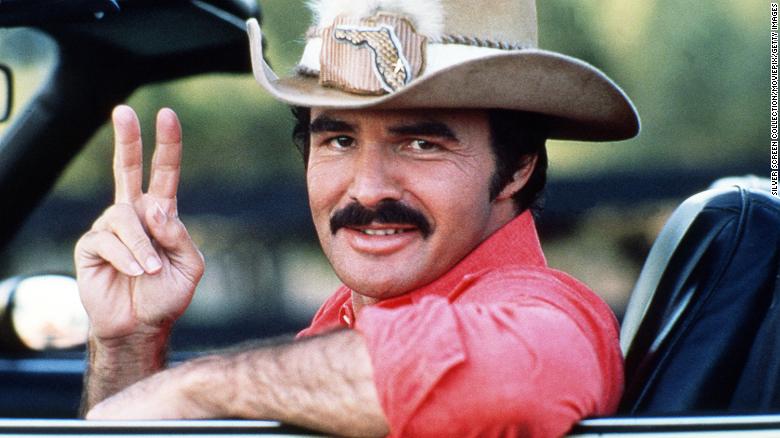

Burt Reynolds in Smokey and The Bandit.
By Robert K. Oermann
Few of the obituaries for Burt Reynolds noted that the Hollywood icon was also a “country star.”
The movie great, who died Thursday (Sept. 6) at age 82, only made one country album and appeared just once on the country-music hit parade. But he was massively popular with country fans, incorporated country music into his film soundtracks and cast more than a dozen country stars in his features.
Although Burt Reynolds played many roles, his portrayals of moonshiners, cowboys, outlaws, NASCAR drivers, rebels and other country archetypes became his most famous film characters.
The soundtrack of Reynolds’ breakthrough film, 1972’s Deliverance, yielded the Grammy-winning country hit “Dueling Banjos” by Eric Weissberg. The plots of such Reynolds vehicles as White Lightning (1973), Gator (1976) and Stroker Ace (1983) were rooted in country culture.
Reynolds came to Nashville in 1973 to create Ask Me What I Am as his country LP. Issued by Mercury Records, it was co-produced by Bobby Goldsboro and Buddy Killen. Despite songwriting contributions from Goldsboro, Red Lane, Ed Bruce and Dick Feller, the album was a commercial failure.
Burt Reynolds returned to Nashville in 1975 to film W.W. & The Dixie Dancekings. Its premiere was held in Music City, as well. In it, he portrayed a crook who promotes a country band. The cast included Don Williams, Roni Stoneman, Lorene Mann, Tootsie Bess and several other country personalities.
The film launched the movie careers of Jerry Reed (1937-2008) and Mel Tillis (1932-2017). Both would be featured in several other Reynolds films, and Reed, in particular, would have a successful acting career on his own. Reed’s second feature with Reynolds was Gator in 1976.
Already a sizable movie star, Burt Reynolds ascended to superstardom with 1977’s Smokey and the Bandit. Although panned by critics, it found a massive audience in Middle America and grossed more than $100 million.
Reed again appeared opposite Reynolds in this film. He also co-wrote the movie’s soundtrack and sang its big country hit, “East Bound and Down.”
Also appearing in Smokey and the Bandit was John Schneider, unbilled in a crowd scene. Two years later, he would inherit Reynolds’ redneck/outlaw persona in the smash hit 1979-85 TV series The Dukes of Hazzard. The two became friends in Hollywood, and Schneider succeeded in Nashville via a string of hit country records in 1984-88.
In the 2016 documentary film Bandit, Brad Paisley, John Rich, Toby Keith and others discussed Smokey and the Bandit’s indelible relationship to country music. In the days following Reynolds’ death, Bandit was screened repeatedly by CMT.
Smokey and the Bandit II was issued in 1980. In addition to Reed, Tillis and Don Williams, the cast included Brenda Lee and The Statler Brothers. All five contributed songs to its soundtrack, as did Tanya Tucker, Roy Rogers and The Sons of the Pioneers. Burt Reynolds sang “Let’s Do Something Cheap and Superficial” on the soundtrack, and his single of it made it to No. 51 on the country charts.
The handsome headliner had a long-term relationship with his Smokey movies co-star Sally Field, whom he later described as “the love of my life.” But he also had notable romances with Nashville-bred pop vocalist Dinah Shore (1916-1994), who was 20 years his senior, and with country superstar Tammy Wynette (1942-1998).
The 1981 Reynolds road-race feature The Cannonball Run again featured Tillis. By this time, Burt Reynolds was in the midst of a five-year reign as Hollywood’s top box-office moneymaker. During this same era, he won six consecutive People’s Choice awards as America’s favorite movie actor.
So his pairing with country superstar Dolly Parton in 1982’s Best Little Whorehouse in Texas was headline news. In the film, Reynolds sang “Sneakin’ Around” as a duet with her. Parton’s remake of “I Will Always Love You” became the soundtrack’s big hit. Whorehouse continued Reynolds’ success streak, becoming a huge box-office hit and winning a best-picture Golden Globe Award.
Jerry Reed co-starred in 1983’s Smokey and the Bandit Part 3, with Reynolds taking a backseat via a cameo appearance. The soundtrack included contributions by Lee Greenwood and Ed Bruce. Mel Tillis reunited with Reynolds for 1984’s Cannonball Run II.
Burt Reynolds next triumphed as a television star. His Evening Shade series of 1990-94 was a major hit. Once again, he offered screen roles to his country-music favorites. During its five-year run, the top-rated Evening Shade featured such guest stars as Vince Gill, Reba McEntire, Tammy Wynette, K.T. Oslin, Kenny Rogers and Jerry Reed, as well as Terry Bradshaw.
Similarly, his 1991-92 TV talk show Burt Reynolds Conversations With booked Gill, Parton, Randy Travis and Tanya Tucker as well as Hollywood royalty.
Reynolds and McEntire co-starred in the 1993 TV movie The Man from Left Field. Goldsboro composed the soundtrack music, a job he performed the same year for the TV western movie The Wind in the Wire. This co-starred Reynolds with Randy Travis. The movie star also appeared in the 1993 music video for the Travis tune “Cowboy Boogie.”
The 1997 film Boogie Nights restored Reynolds’ status as a respected actor. The film garnered him his finest reviews since Deliverance, won him a Golden Globe award and earned him an Oscar nomination.
In 2005, Reynolds co-starred in the hit movie update of The Dukes of Hazzard. Willie Nelson and Junior Brown were also featured.
The aging cinema thespian returned to Tennessee to portray a washed-up actor in 2016’s The Last Movie Star. It was shot and premiered in Knoxville and featured the Nashville Film Festival in its plot. Again, his performance was roundly praised by reviewers.
Burt Reynolds had been ill, but his death last week was unexpected. Over the weekend, Parton, Schneider, Travis and McEntire all offered memorial tributes to their fellow “country star.”

About the Author
Robert K. Oermann is a longtime contributor to MusicRow. He is a respected music critic, author and historian.View Author Profile


